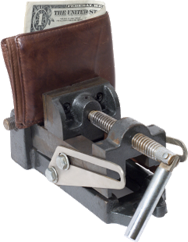 The IRS takes its collection process very seriously and when a taxpayer ignores notices the consequences can be downright devastating. Levies or fines against assets or property, like your car, home, bank and income accounts, are just a few ways the government will take back what they think they are owed.
The IRS takes its collection process very seriously and when a taxpayer ignores notices the consequences can be downright devastating. Levies or fines against assets or property, like your car, home, bank and income accounts, are just a few ways the government will take back what they think they are owed.
If the IRS is enforcing the collection process that usually means all other attempts to get you to pay have failed. Collections doesn’t mean the end of the world, however, and the issue can be dealt with in numerous ways. Take a look at these tips to stopping the IRS collection process:
- Try qualifying for “Uncollectible” status. There are times where people just can’t pay their taxes, often due to financial hardship. The IRS will allow you to improve your finances until such time you can pay the taxes owed to the IRS. Fill out Form 433-F and send it in. If the government agrees with your situation, then you are in luck for the time being. All collection calls will stop as well.
- Pay off everything now. The best way to avoid the full brunt of the collections process is to pay the IRS everything you owe, including penalties and interest.
- Offer in Compromise. Using this method will allow a taxpayer to settle their balance with the IRS for a lower amount. It takes the IRS money to pursue collection costs, so the government may decide that it would cost more to pursue than to settle.
- Appeal your collection. There is a way to stop collection calls and notices dead in their tracks and that is to appeal the IRS decision. By doing so, the IRS must review your case and allow you to present your findings, which could take up to a year. This process is tricky, however, and often requires the help of a professional.
Getting financial help for tax relief from a tax expert is often one of your best courses of action when facing down tax debt and the IRS. Tax professionals can help you decide on the best course of action as well as help deal with the IRS directly. Be sure you get help as soon as possible, however, as tax debt left unresolved can garner greater consequences down the road.